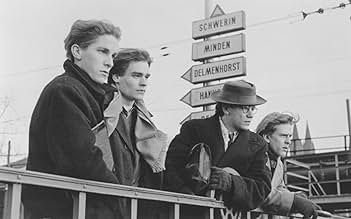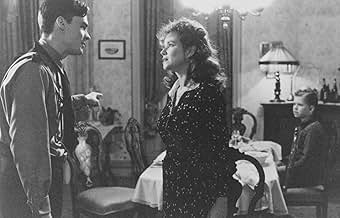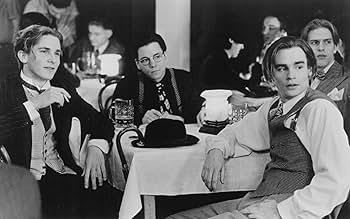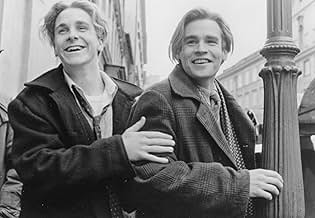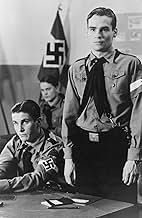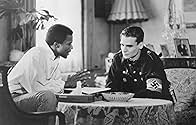CALIFICACIÓN DE IMDb
6.8/10
18 k
TU CALIFICACIÓN
Un grupo de adolescentes adora la música prohibida en la Alemania nazi justo antes del estallido de la II Guerra Mundial.Un grupo de adolescentes adora la música prohibida en la Alemania nazi justo antes del estallido de la II Guerra Mundial.Un grupo de adolescentes adora la música prohibida en la Alemania nazi justo antes del estallido de la II Guerra Mundial.
- Dirección
- Guionista
- Elenco
- Premios
- 1 premio ganado y 1 nominación en total
Jessica Hynes
- Helga
- (as Jessica Stevenson)
- Dirección
- Guionista
- Todo el elenco y el equipo
- Producción, taquilla y más en IMDbPro
Opiniones destacadas
I really don't understand a lot of these reviewers. The movie far from trivializes anything about the Nazis, it simply tries to portray a moment before the bloodiest war in history on a smallish scale.
Would it be better to just have a movie that says "Nazis are bad and they killed six million Jews."? No, because that wouldn't be a movie.
It's like when people complained that a mini-series about Hitler's life that was supposed to be shown on TV would "humanize Hitler". Well, news flash, he WAS a human. That's the worst part, a human could do that sort of thing. What good is it to call evil-doers monsters and then leave it at that? When "Swing Kids" succeeds is when it's portraying the conflicts of youth as their country goes mad. Can anyone honestly say they feel NO sympathy for those who were forced to join the Hitler youth? It's easy to say you would have done different.
And the idea that the music being key somehow trivializes the events of WWII, um, it's based on an ACTUAL subculture, swing kids. There were lots of them and at first they were fairly lacking in politics, but later in the 40s when they were cracked down on more so by the Nazis some were more active.
It's not like the movie makers pulled the concept of kids, Nazis and swing out of their asses, which is what people seem to think.
And at least it was something, at least it wasn't giving in totally. Remember these were young kids, high-school age, nobody can expect them all to be Sophie Scholl.
Where "Swing Kids" lacks is its occasional excessive heavy-handedness. The ending is a bit excessive, something more subtle would have been better.
But as I say, the conflicts between the three main leads are fantastic and bring up questions of what you would do in such circumstances. I think the boys's indifference in respect to the Jew being beat up in the beginning of the movie is a good touch. This is NOT about the holocaust, because it was just starting and was largely unknown at the time. I hate when people can't lose what they know to watch a movie.
I recommend everyone to read some swing kids history, just look them up, it makes the movie much better and more interesting to know the facts.
This is a fairly good movie with very good acting, great great music and costumes, a great story that was influenced by deeply interesting history, and too much heavy handedness.
But seriously, who can resist a movie put out by Disney that includes the line of dialog "You're turning into a f*cking Nazi!"?
Would it be better to just have a movie that says "Nazis are bad and they killed six million Jews."? No, because that wouldn't be a movie.
It's like when people complained that a mini-series about Hitler's life that was supposed to be shown on TV would "humanize Hitler". Well, news flash, he WAS a human. That's the worst part, a human could do that sort of thing. What good is it to call evil-doers monsters and then leave it at that? When "Swing Kids" succeeds is when it's portraying the conflicts of youth as their country goes mad. Can anyone honestly say they feel NO sympathy for those who were forced to join the Hitler youth? It's easy to say you would have done different.
And the idea that the music being key somehow trivializes the events of WWII, um, it's based on an ACTUAL subculture, swing kids. There were lots of them and at first they were fairly lacking in politics, but later in the 40s when they were cracked down on more so by the Nazis some were more active.
It's not like the movie makers pulled the concept of kids, Nazis and swing out of their asses, which is what people seem to think.
And at least it was something, at least it wasn't giving in totally. Remember these were young kids, high-school age, nobody can expect them all to be Sophie Scholl.
Where "Swing Kids" lacks is its occasional excessive heavy-handedness. The ending is a bit excessive, something more subtle would have been better.
But as I say, the conflicts between the three main leads are fantastic and bring up questions of what you would do in such circumstances. I think the boys's indifference in respect to the Jew being beat up in the beginning of the movie is a good touch. This is NOT about the holocaust, because it was just starting and was largely unknown at the time. I hate when people can't lose what they know to watch a movie.
I recommend everyone to read some swing kids history, just look them up, it makes the movie much better and more interesting to know the facts.
This is a fairly good movie with very good acting, great great music and costumes, a great story that was influenced by deeply interesting history, and too much heavy handedness.
But seriously, who can resist a movie put out by Disney that includes the line of dialog "You're turning into a f*cking Nazi!"?
The central characters in this movie are unpolitical teenagers who have no concern with the larger political issues of Naziism and simply want to enjoy themselves. Their only perspective is that Nazis are stuffy, conformist jerks and no fun at all. For this reason, a number of mainstream critics (among them Ebert and Berardinelli) trashed the picture for trivializing the crimes and horrors of the Third Reich. These critics, I think, miss the point.
The value of the movie is precisely that it is trivial. There is no hindsight. The audience, like the characters, is caught up in the everydayness of everyday life in a totalitarian state. The Nazis are the government, and as far as anyone can see in 1938-39 they are going to go on being the government forever. The war hasn't happened yet. The Swastika flag flying over every post office and courthouse doesn't give them a little shudder of horror; it's as normal as the Stars and Stripes is to us. All sensible, respectable people who aren't Nazis themselves go along with the Nazis, because they have no reason not to.
Auschwitz hasn't happened yet either. Sure, there are concentration camps out there somewhere, but that has nothing to do with normal, ordinary people who behave themselves. Unless you happen to know a Jew or a political dissident yourself, what the government is doing to people like that isn't your problem.
The teen-aged lead characters find themselves in opposition and in trouble, not because they have any principled objections to the government, but simply because they find respectable culture boring and want to amuse themselves. The first reaction of authority, in the person of Kenneth Branagh's kindly Gestapo man, is that all they need is a good talking to, a second chance, and a little constructive guidance in the Hitler Youth and they'll grow up to be good citizens. He's fifty percent right; Thomas does respond positively to the comradeship and healthy outdoor activity he finds there.
The ultimate choices made by the two boys are governed not by principle but by their personal situations. Thomas has been rebelling against his cold, pompous, wealthy father, whom he loathes, and he ultimately decides that being a dutiful Nazi and denouncing the old man to the Gestapo offers him much better revenge than dancing to illegal jazz records. Peter recoils from the Hitler Youth (and from his former friend) because his own father had disappeared, perhaps into the camps, after the Nazis took power several years earlier.
There's's no hindsight in the movie's perspective, and no heroism. Instead, it gives us ordinary, everyday people dealing with ordinary everyday life as they find it, from the viewpoint of a high school student. The movie leads the adolescents who are its target audience to ask themselves an unpleasant question -- would they be any different, any more politically aware, if they were in the same situation? Indeed, would they even realize it if they were actually in the same situation now?
The implicit answer is that they probably wouldn't be all that different from ordinary non-political German teenagers in 1938, minding their own business, going about their own lives, and at most trying to carve a little more personal space than the government wants to give them. That's disconcerting and not at all flattering, which is why Swing Kids is worth watching.
The value of the movie is precisely that it is trivial. There is no hindsight. The audience, like the characters, is caught up in the everydayness of everyday life in a totalitarian state. The Nazis are the government, and as far as anyone can see in 1938-39 they are going to go on being the government forever. The war hasn't happened yet. The Swastika flag flying over every post office and courthouse doesn't give them a little shudder of horror; it's as normal as the Stars and Stripes is to us. All sensible, respectable people who aren't Nazis themselves go along with the Nazis, because they have no reason not to.
Auschwitz hasn't happened yet either. Sure, there are concentration camps out there somewhere, but that has nothing to do with normal, ordinary people who behave themselves. Unless you happen to know a Jew or a political dissident yourself, what the government is doing to people like that isn't your problem.
The teen-aged lead characters find themselves in opposition and in trouble, not because they have any principled objections to the government, but simply because they find respectable culture boring and want to amuse themselves. The first reaction of authority, in the person of Kenneth Branagh's kindly Gestapo man, is that all they need is a good talking to, a second chance, and a little constructive guidance in the Hitler Youth and they'll grow up to be good citizens. He's fifty percent right; Thomas does respond positively to the comradeship and healthy outdoor activity he finds there.
The ultimate choices made by the two boys are governed not by principle but by their personal situations. Thomas has been rebelling against his cold, pompous, wealthy father, whom he loathes, and he ultimately decides that being a dutiful Nazi and denouncing the old man to the Gestapo offers him much better revenge than dancing to illegal jazz records. Peter recoils from the Hitler Youth (and from his former friend) because his own father had disappeared, perhaps into the camps, after the Nazis took power several years earlier.
There's's no hindsight in the movie's perspective, and no heroism. Instead, it gives us ordinary, everyday people dealing with ordinary everyday life as they find it, from the viewpoint of a high school student. The movie leads the adolescents who are its target audience to ask themselves an unpleasant question -- would they be any different, any more politically aware, if they were in the same situation? Indeed, would they even realize it if they were actually in the same situation now?
The implicit answer is that they probably wouldn't be all that different from ordinary non-political German teenagers in 1938, minding their own business, going about their own lives, and at most trying to carve a little more personal space than the government wants to give them. That's disconcerting and not at all flattering, which is why Swing Kids is worth watching.
I'm a History teacher and we use Swing Kids as an introduction to the topic of alternative youth groups in Nazi Germany. I'm not saying that the film is 100% accurate, obviously some dramatic licence has to be taken, but its not far off. Many people on this site have questioned the accuracy, and validity of the film, especially mentioning the lack of consideration of the treatment of the Jews. However that is not what this film is about (if that is what you want see The Pianist or Schindler's List - also excellent films).
This film is looking at how some German youths avoided the Hitler Youth and the nazi regime insofar as they could, and what they spent their time doing (dancing, listening to swing music and being with their friends).It does show some useful aspects about how the Hitler Youth were expected to behave and the propaganda they were exposed to, as well as about swing youth and their attitude to the regime.It is an entertaining and poignant film which explores friendship,romance and growing up against the backdrop of one of the most vilified periods in modern history
Basically Swing Kids does what it does well. Maybe it isn't a Schindler's List, but it does have its merits.Watch it and you'll find them!
BTW - could I just point out, many people on here have referred to the Holocaust, as though it is interchangeable with the Nazi regime, and have used the phrase in their reviews. Just to clear up this: the holocaust specifically refers to the gassing of Jews at extermination camps from 1942 onwards, essentially the Final Solution. As this film is set in 1939 it is prior to this.
This film is looking at how some German youths avoided the Hitler Youth and the nazi regime insofar as they could, and what they spent their time doing (dancing, listening to swing music and being with their friends).It does show some useful aspects about how the Hitler Youth were expected to behave and the propaganda they were exposed to, as well as about swing youth and their attitude to the regime.It is an entertaining and poignant film which explores friendship,romance and growing up against the backdrop of one of the most vilified periods in modern history
Basically Swing Kids does what it does well. Maybe it isn't a Schindler's List, but it does have its merits.Watch it and you'll find them!
BTW - could I just point out, many people on here have referred to the Holocaust, as though it is interchangeable with the Nazi regime, and have used the phrase in their reviews. Just to clear up this: the holocaust specifically refers to the gassing of Jews at extermination camps from 1942 onwards, essentially the Final Solution. As this film is set in 1939 it is prior to this.
i have read the comment about SWING KIDS not being authentic. well, after doing a bit of research on this topic (swing scene in germany in the third reich) i have to say that there was quite a big scene there. yes, the film might have exaggerated a bit (the hair was not quite as long and they had to cut down on the way they dressed even though they tried as much as they could on the zoot suit front). but it is a fact that there were dances in different cafes and they didnt like the Nazi regime. so i would say give the film makers some slack and a bit of artistic freedom! they tried to portray a group of youngsters that found cure in music and stuck together in a difficult time. i really appreciated this film as normally you wouldnt know about them at all!!! two thumbs up from me as well!!!
Ok for you people who refer to all the Germans as "worthless human beings" and talk about how this movie didn't focus on the holocaust, etc....WAKE UP! The point of this movie was to give another perspective on the war. Not all Germans were souless killers. Throughout the movie you could see the consciences of the main characters being pushed and pulled about what was happening. Over here in Western culture, everything is portrayed in black and white: all the Germans were completely evil, and we were the good ones. No one is denying that the Germans committed some horrific atrocities, but there were some who resisted doing those crimes, and others who actually believed that they were morally in the right because of centuries of ingrained anti-semitism. Geez, North America was anti-semitic then too! Swing Kids looks at Germany from the inside, and the different forces that were at work. Everyone knows what happened during the Holocaust....this movie wasn't about that. I think people should look at all different viewpoints before classifying all the people in a certain group (ie all of the German nation) into one cubbyhole of evil.
¿Sabías que…?
- TriviaDespite the fact that Kenneth Branagh plays a major role in this movie, he is uncredited. Reportedly, Branagh refused to be credited out of concern that he would be billed above Robert Sean Leonard, Christian Bale, and the other boys, whom Branagh proclaimed were the real stars of the film.
- ErroresAt the end of the film, when Willy is running after Peter and stops, there is clearly nothing at Willy's feet. Later, after being told "Swing Heil", he grabs an umbrella on a wet poster at his feet that clearly wasn't there before.
- Citas
Arvid: I would rather belong to any one... ANYONE, than belong to the Nazis like you do.
Thomas Berger: That's because you have everything backwards. Nazis go anywhere they want, do anything they want, everyone gets out of our way.
Arvid: Quiz time. Got your glasses on.
Thomas Berger: What?
Arvid: It means you don't know who your friends are.
- Bandas sonorasLife Goes to a Party
Written by Harry James and Benny Goodman
Selecciones populares
Inicia sesión para calificar y agrega a la lista de videos para obtener recomendaciones personalizadas
- How long is Swing Kids?Con tecnología de Alexa
Detalles
Taquilla
- Presupuesto
- USD 12,000,000 (estimado)
- Total en EE. UU. y Canadá
- USD 5,632,086
- Fin de semana de estreno en EE. UU. y Canadá
- USD 1,967,957
- 7 mar 1993
- Total a nivel mundial
- USD 5,632,086
- Tiempo de ejecución1 hora 52 minutos
- Color
- Mezcla de sonido
- Relación de aspecto
- 1.85 : 1
Contribuir a esta página
Sugiere una edición o agrega el contenido que falta

Principales brechas de datos
By what name was Los últimos rebeldes (1993) officially released in India in English?
Responda

